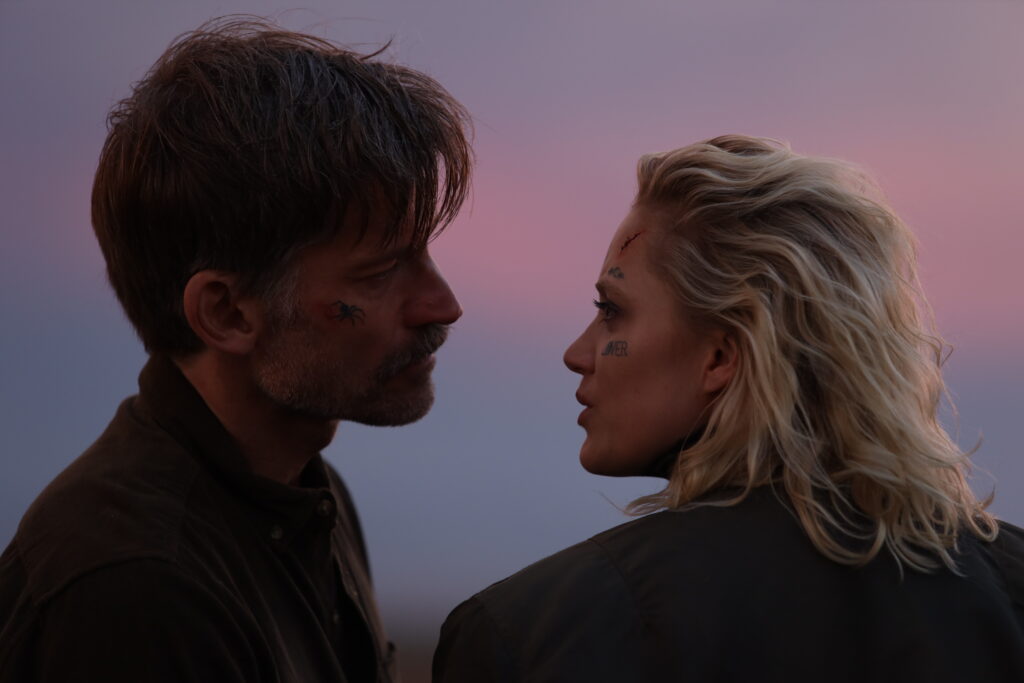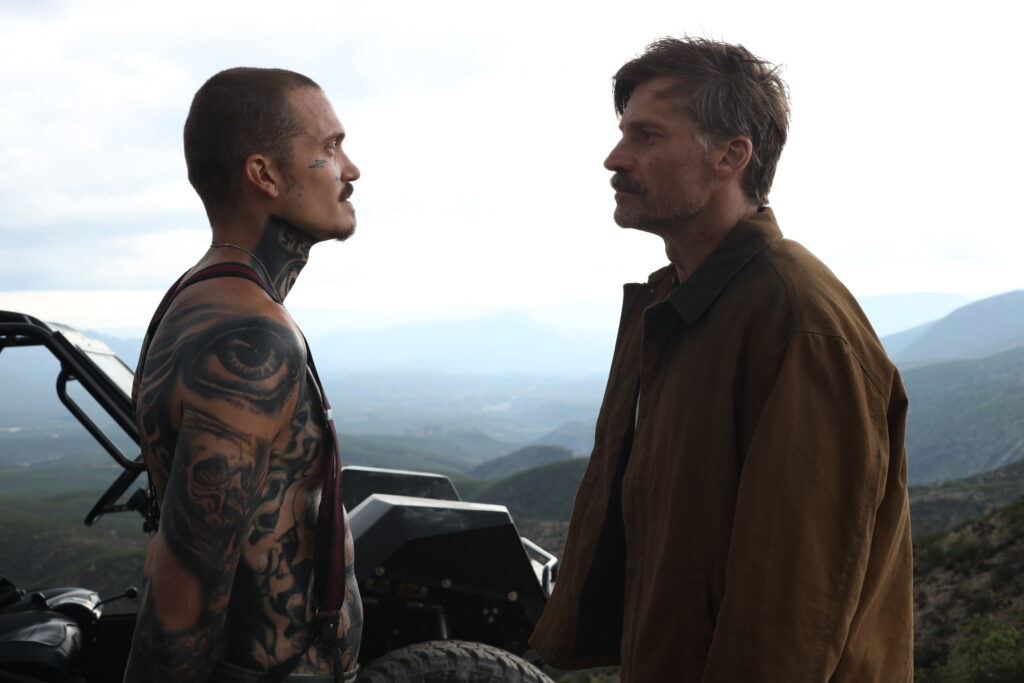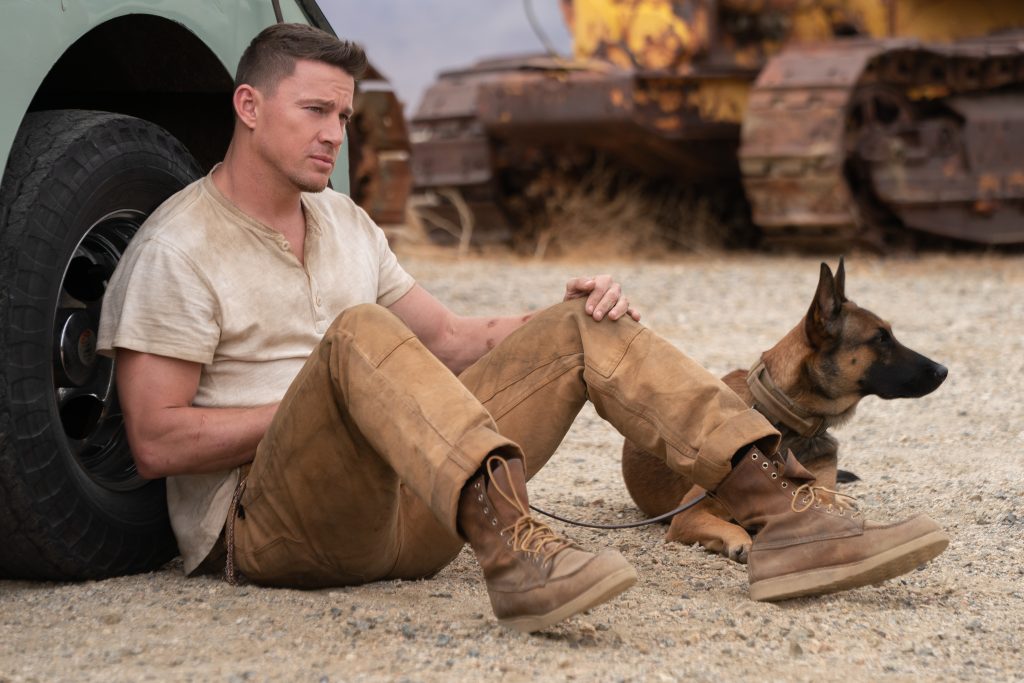June 27, 2023
by Carla Hay

Culture Representation: Taking place in 2020, in New Mexico, the action film “God Is a Bullet” features a predominantly white cast of characters (with a few African Americans and Latinos) representing the working-class, middle-class and wealthy.
Culture Clash: A police officer becomes a rogue vigilante while investigating the deadly cult that kidnapped his 14-year-old daughter and murdered his ex-wife and her lover.
Culture Audience: “God Is a Bullet” will appeal primarily to people who don’t mind watching ultra-violent and mindless action flicks.

Trashy and moronic, “God Is a Bullet” is a pathetic excuse to show brutal and violent misogyny. The dialogue is as cringeworthy as the scummy characters. Jamie Foxx is a co-headliner, but he’s in this bloated 155-minute movie for less than 15 minutes.
Written and directed by Nick Cassavetes, “God Is a Bullet” is based on Boston Teran’s 1999 novel of the same name. Even though the movie is adapted from a work of fiction, there’s a caption shown in the introduction of the movie that says, “Based on a true story.” At the end of the film, another caption states that although the movie is based on a true story, parts of the story were fictionalized for the movie. Whatever the filmmakers want to call the movie version of “God Is A Bullet,” it’s still time-wasting garbage.
The beginning of “God Is Bullet” (which was filmed on location in New Mexico) is an indication of some of the nauseating scenes that pollute the movie: A woman is seen vomiting multiple times. That woman is Case Hardin (played by Maika Monroe), a 23-year-old, tattooed vagabond, who has escaped from a small but ruthless cult that has about seven to nine members. The cult kidnapped Case when she was 11 years old. Case lived with the cult for the next 12 years, until recently, when she decided to leave the cult for good.
The mostly male cult is led by a disgusting sadist named Cyrus (played by Karl Glusman), who is shown committing almost every type of heinous violent crime you can imagine throughout the movie. The opening scene of “God Is a Bullet” shows Case, who is a needle-using drug addict, vomiting in a toilet in a jail cell. Some viewers will feel like retching when they see some of the gruesome torture and murder scenes in this vile movie. Case is in jail for heroin possession and assault with a knife.
It’s late December 2020, and people are in the midst of the end-of-year holiday season. An early scene in the movie shows the heavily tattooed members of Case’s former cult hanging out at a parking lot near a strip of retail stores. Now that Case is no longer in the cult, the only woman who’s left in the cult is Lena (played by Gina Cassavetes), who looks like a reject from a Marilyn Manson video.
A little girl, who’s about 9 or 10 years old, is playing with a balloon in the parking lot while her mother is shopping inside a nearby store. And you know what happens next: The cult members kidnap her. It’s later shown in the movie that this cult is involved in child prostitution and other sex trafficking of children. When Case was kidnapped as a child by this cult, she was forced to endure the same sexual abuse. Flashbacks of a pre-teen Case (played by Elise Guzowski) show some of this forced prostitution.
After this kidnapping in the parking lot, the cult isn’t done with its crime rampage. On December 24, 2020, the cult members do a nighttime home invasion of mansion, where they savagely murder two of the mansion’s residents: divorcée Sarah Hightower (played by Lindsay Hanzl) and her boyfriend Sam (played by Kola Olasiji). A third resident of the home is Sarah’s 14-year-old daughter Gabi Hightower (played by Chloe Guy), who is kidnapped by the cult.
The next morning, on Christmas Day, two people arrive at the house for a planned visit: Sarah’s ex-husband Bob Hightower (played by Nikolaj Coster-Waldau) and Sarah’s businessman father Arthur Naci (played by David Thornton), who are shocked and devastated when they go inside the house and see the bloody crime scene. They also quickly determine that Gabi has been kidnapped.
Bob is a police detective, but he’s not very well-respected in his police department, because he’s assigned to mainly doing paperwork. Predictably, Bob wants to be the lead investigator of this kidnapping/murder case, but he’s blocked by colleagues, who think he won’t be objective, and because Bob doesn’t have enough experience doing police work outside of the office. One co-worker comes right out and calls Bob a “desk jockey” and a “seat warmer.”
Undeterred, Bob thinks that the cult is responsible and goes on a mission to find this nomadic and elusive cult. And it just so happens that Bob finds out that a woman who’s currently in a nearby jail cell is a former member of this cult. Bob visits Case and asks her for information in tracking down the cult members. Bob, who is very religious, is immediately judgmental of Case. When they first meet, Bob treats Case like she’s a degenerate.
Bob is somewhat remorseful when he finds out that Case was kidnapped as a child and forced to be in the cult. She says to Bob about the cult members: “We all came from family-oriented communities—even me.” Case later explains why, as an adult, she has not been in contact with her single mother, who still thinks that Case is missing: Because of all the crimes she committed while in the cult, Case has a lot of shame and is afraid that her mother will reject her.
Case gives Bob this advice on finding his kidnapped daughter Gabi: “If you want her back, you have to get her yourself.” She adds, “You think you can do this alone. No offense, but you don’t send sheep to hunt wolves.” It should come as no surprise that Bob arranges for Case to be let out on bail so that she can help him track down her former cult colleagues.
One of the first things that Bob and Case do is go to a remote desert-like area where the cult members have been known to congregate at a compound. A cult member named the Ferryman (played by Foxx) is still hanging out at one of the houses in this compound. The Ferryman’s skin looks like he has vitiligo. He also has a prosthetic left arm.
Bob thinks the best way to find the cult is to “infiltrate” the cult, even though he looks like he would never fit in with this scuzzy-looking group. It leads to a ridculous scene of the Ferryman giving Bob tattoos on parts of Bob’s body, while Case gives Bob a face tattoo. After getting these tattoos, Bob doesn’t look like a menacing cult member. He looks like a man going through a sad mid-life crisis.
Meanwhile, viewers are taken into the home of a couple with a very dysfunctional and miserable marriage: Maureen Bacon (played by January Jones), who acts like she’s some kind of femme fatale, is shown taunting the masculinity of her police sergeant husband John Lee Bacon (played by Paul Johansson), because apparently she’s fed up with their lack of a sex life. When she starts to ridicule him for liking gay male porn, he brutally assaults her. Maureen’s reaction is to laugh and tell John Lee: “You’re such a wimp!”
John Lee just happens to be a colleague of Bob, who has now gone rogue and decided to become a vigilante, with Case as his sidekick. The hunt for the cult members gets dragged out in mind-numbing ways that include showing more tortures and murders committed by the cult members, with Cyrus the one giving the orders and participating. The other cult members have names like Gutter (played by Ethan Suplee), Snatch (played by Rooter Wareing) and Shitstain (played by Zac Laroc), and they have no distinguishable personalities beyond the mayhem that they commit.
There’s also a sniveling drug dealer named Errol Grey (played by Jonathan Tucker), who gets caught in this maelstrom of destruction. Case knows Errol because he used to be her drug dealer. Case tells Bob that she’s “clean and sober,” but she still pretends to be a needle-using drug addict during their “undercover” investigation when she encounters Errol again.
Several flashbacks show that when Case would try to leave the cult, Cyrus would viciously beat her up. If Lena tried to come to Case’s defense, then Cyrus would attack Lena too. It’s later shown that Case and Lena had some kind of sexual relationship when they were in the cult together. Lena apparently had stronger feelings for Case than Case did for Lena, who gets very jealous when she sees Case with Bob. The purpose of the Lena character is to literally be a token female in a group of men who all seem to hate her.
As if this cesspool movie weren’t icky enough, a subplot develops where Bob and Case start to become romantically attracted to each other. It’s not their age gap that’s the problem. It’s the fact that this rotten movie wants to push a narrative that even while he’s searching for his kidnapped daughter and seeking justice, this broken man is still “hot enough” to possibly get some sexual action from someone who’s in no emotional shape to be in a relationship either. Case sometimes calls Bob her “boy toy,” which is a weird thing to say about someone who’s old enough to be her father.
Needless to say, with a terrible screenplay and soulless direction, the acting performances in “God Is a Bullet” range from empty to bottom-of-the-barrel awful. Coster-Waldau looks like he’s sleepwalking through a lot of his scenes. Monroe overacts in many scenes, where she’s trying to come across as part damaged waif, part redneck seductress. Glusman is basically doing a not-very-good caricature of a twisted villain. (On a side note, Monroe and Glusman previously co-starred as spouses in the 2022 horror movie “Watcher,” which is a superior film to “God Is a Bullet” in every way.)
The Ferryman character didn’t even need to be in the movie because he’s barely in the film and has no real bearing on the plot, unless you waited your whole life to see Foxx in a movie where he plays a tattoo-making character who has a prosthetic arm. Foxx’s presence in “God Is a Bullet” is just a manipulative “bait and switch” way for the filmmakers to attract viewers by using Foxx’s celebrity name as a headliner, even though his role in the movie is really an extended cameo.
The movie’s scenes where women and girls get assaulted, exploited or murdered are filmed with a particular glee that is simply atrocious. The film has a “plot twist” that is not surprising at all. There are violent movies that can have meaning if the story is compelling and has something interesting to say. “God Is a Bullet” is just an onslaught of asinine trash that is as putrid as the movie’s nasty characters.
Wayward Entertainment released “God Is a Bullet” in select U.S. cinemas on June 23, 2023. The movie will be released on digital and VOD on July 11, 2023.




